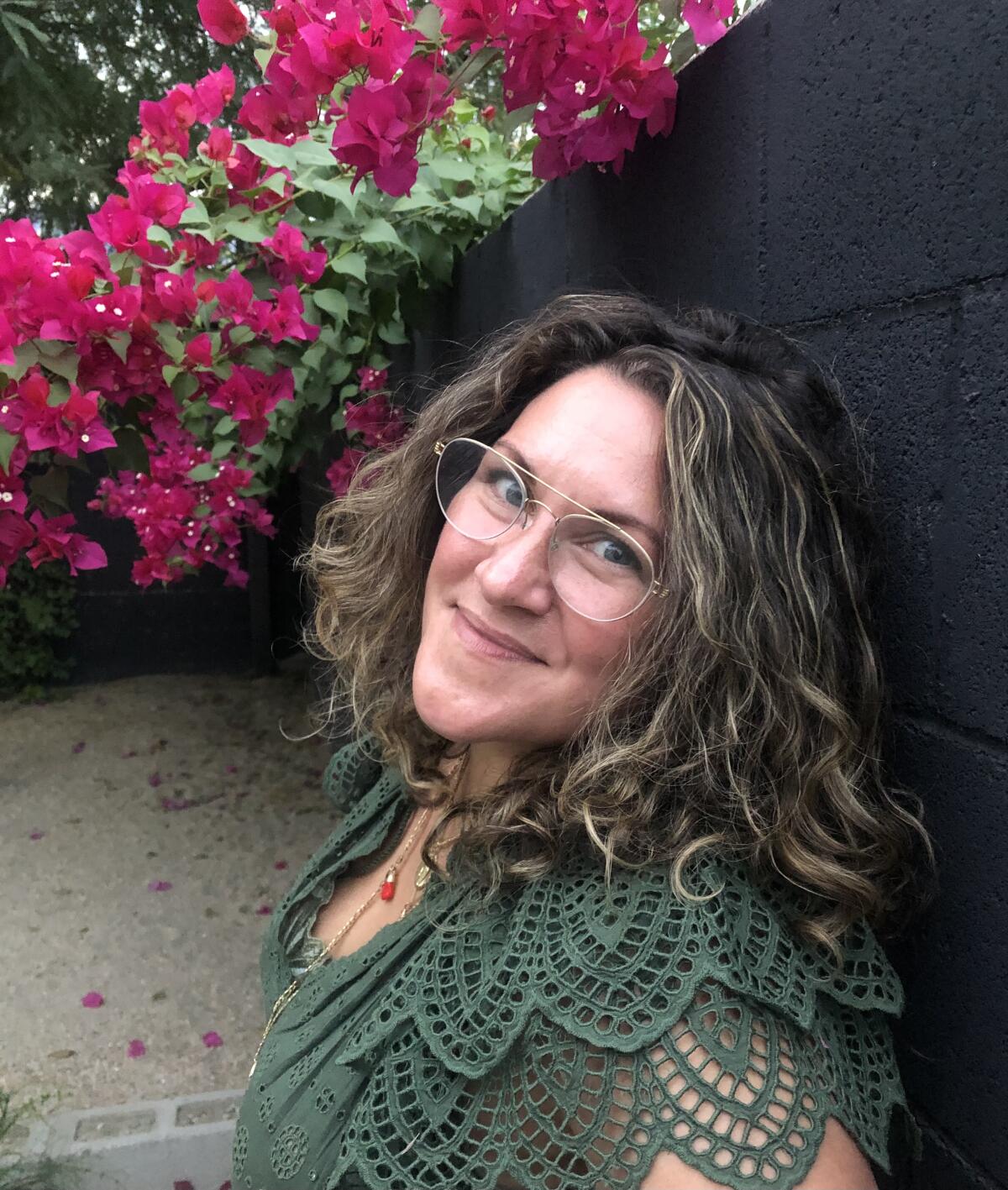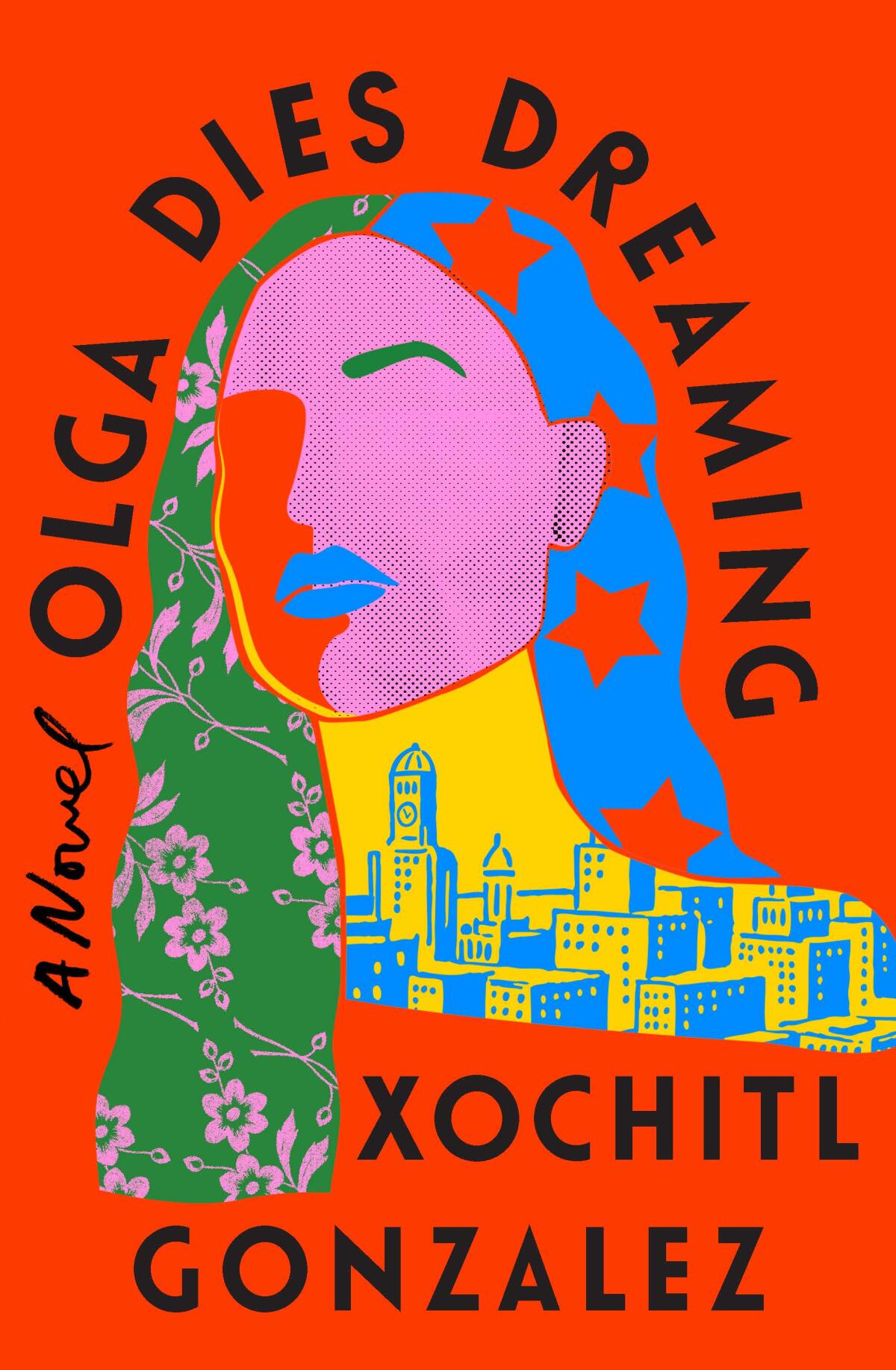From poor kid to elite wedding planner to debut author: Xochitl Gonzalez feels ‘divine’

On the Shelf
Olga Dies Dreaming
By Xochitl Gonzalez
Flatiron: 384 pages, $28
If you buy books linked on our site, The Times may earn a commission from Bookshop.org, whose fees support independent bookstores.
One February morning in 2019, Xochitl Gonzalez was reading Naomi Klein’s “The Battle for Paradise” as Brooklyn’s Q train bobbed along the tracks. She was headed to her job at Hunter College when a song came on through her headphones: “Rican Beach” by Hurray for the Riff Raff, a group that channeled Puerto Rico’s struggles in the wake of Hurricane Maria. The idea came to her in a flash.
For months, Gonzalez had been brainstorming a plot engine that would drive her novel’s protagonist. “I’d written all these weird stories where she’s in different circumstances, but I didn’t have a larger vehicle for her,” she said in a Zoom interview.
She hopped off the train, walked into a Starbucks to ask for a pen and napkin, and scribbled a synopsis: “Robin Hood wedding planner robs from her clients, sends money to mother (revolutionary?) to fix house in Puerto Rico.”
A slightly different version of that elevator pitch would become Gonzalez’s highly anticipated debut. “Olga Dies Dreaming,” out this week from Flatiron Books, follows Olga, a tough, Type A wedding planner for the ultra-rich whose personal life is in shambles.
Like many debuts, Gonzalez’s novel follows some of the contours of her life story — a past life as a wedding planner; humble roots and grand ambitions; an activist mother who abandoned the family. It’s also a larger story about resilient Latino communities that often go unseen — about class, identity, colonization, political power and the American dream. (Hulu is also adapting it for a pilot starring Aubrey Plaza.)
Another thing that distinguishes this particular bildungsroman is the age of its heroine. That’s in part what Megan Lynch, publisher and senior vice president for Flatiron, found engaging.
Out with “L.A. Weather,” her third novel, María Amparo Escandón talks about fleeing L.A.’s wildfires, dreading the climate and loving her adopted city.
“I loved that this was a story about a woman in her 40s who was finding love and confronting big issues in her life,” Lynch said. “This wasn’t an ordinary coming-of-age story — it’s a character who had some real life experiences behind her and was still at an exciting precipice.”
Gonzalez didn’t know the extent of it two Februarys ago, but she was on a precipice of her own. The same day she scrawled “Olga’s” plot on a napkin, she was accepted into the Iowa Writers’ Workshop. By the time she started her MFA in August, she’d written 200 pages of the novel. A semester later, she had a two-book deal.
For Gonzalez, now 44, it was the kind of overnight success that was decades in the making. She’d spent much of her 20s and 30s living in Fort Greene, Brooklyn, and playing wedding planner to “rich, rich, rich hipsters,” including founders of Vice and Acne Jeans and the original investors of Instagram.
Along came the 2008 recession, when “the bottom fell out of everything.” Their business survived, but the Wall Street crash had hollowed out the middle of the business; as the wealth divide grew, so did the split between her life and her increasingly super-rich clientele.
“It was fun in the beginning because it was creative, then after a while we felt intellectually stymied but didn’t know what else to do,” said Gonzalez. She realized, as Olga does, that she was losing her values and her identity to “the trappings of American success.” She and her business partner eventually segued into strategic consulting.
“That’s very much at the heart of what Olga’s journey was, and it’s at the heart of what my journey was — of being so lost and clinging to anything and trying to find my own center again.”
When we spoke, Gonzalez was in a “minor quarantine” with her rescued Cavalier King Charles spaniel, Hectah Lavoe, after being exposed to COVID-19.
“I think I’ve got an immune system of steel,” said Gonzalez matter of factly; she contracted the virus early in the pandemic, and believed she was the least sick of her friends. “I grew up in a cesspool of germs.”
Over the last three months, 17 writers provided diaries to the Times of their days in isolation, followed by weeks of protest. This is their story.
Gonzalez is friendly, razor sharp and ebullient; her thoughts seem at first to meander but then converge on a single point of connection. She calls Olga “an emotional disaster” and “an avatar for me if I’d never had therapy.” She’s put in the work to be a better version of her protagonist.
While Gonzalez was still in graduate school and reading final proofs of her debut, a copy of “Olga Dies Dreaming” found its way into the hands of Jeffrey Goldberg, the Atlantic’s editor in chief, “who was smitten” by the book. At the end of their Zoom meeting, he asked her to contribute a weekly newsletter in the magazine about class and gentrification. It’s called “Brooklyn, Everywhere.”
“Things have just kind of been coming up and I have been trying to say yes to the things that feel really good,” she said. “Everything about this feels quite divine.”
In short, she’s doing what she loves most. “My happiest place … is just when I’m vomiting out sentences.”

It took Gonzalez a while to figure that out. Raised in Brooklyn’s Sunset Park at a time when Black and brown communities were being “obliterated” by AIDS, crack, harsh drug laws and the first tendrils of gentrification, she wanted more for herself, but her maternal grandparents, who had a GED between them, weren’t in a position to offer advice.
Neither could her parents. Gonzalez’s father (like Olga’s) struggled with substance abuse; her mother — who organized unions across Latin America and ran for office for the Socialist Workers Party — left her at an early age with her grandparents.
Under pressure from them, she would visit during holidays and major milestones. Beyond that, they never had an independent relationship.
The weight of that absence is a big theme in her novel. The fictional Blanca, mother to Olga and her brother Prieto, abandons them to dedicate her life to revolution. But she remains an aching, omniscient presence, sending letters without return addresses to her children, weighing in on their choices and the value of revolution.
“In my research I became obsessed with how many children of famous activists had what they felt were one-way-street relationships with their parents,” she said. “The cause above all.”
By the time Gonzalez sat down to write Blanca, “I realized that she was no more bad or good than any of the other characters, she was just fundamentally wired differently.”
The book wasn’t therapy for the author — that’s what actual therapy was for — but it did offer a sort of “micro catharsis.” Now she hopes to help others from similar backgrounds understand that “your parents’ choices and dysfunctions don’t necessarily have to be yours.”
Gonzalez made it to Brown University for her undergraduate degree with support from her public school teachers and a small scholarship, but still had no “blueprint for what to do after school,” she said. She wanted to be a creative writing major but felt intimidated — not least by her perfect roommate, a fiction writer who had already won contests and fellowships.
“I was like ughhhhh,” said Gonzalez. “At that age, plus the culture shock, I said to myself ‘You have to find your own lane. She’s obviously really good at this and I should find something else to do.’” She studied art history instead.
Many years and several careers later, at age 40, Gonzalez confided in Yelena Gitlin Nesbit, her best friend since childhood, as they browsed the racks of Neiman Marcus Last Call: She was ready to try writing.
“I thought it made perfect sense,” said Nesbit. “I knew that if she set her mind to it, that she would be a huge success. And I don’t say that lightly.” Nesbit wasn’t naive about her prospects; she is a senior director of publicity for an imprint of HarperCollins.
“But I knew this was the right path for her, and I said that as a professional and as a friend.”
Gonzalez has exceeded the expectations of both.
Her book advance in hand, Gonzalez could afford to move back from Iowa — where she’d completed her writing MFA — to New York.
She bought an apartment in Brooklyn’s Clinton Hill with a rare backyard. There’s a rat problem, but nothing’s perfect.
“I’ve never owned anything in my entire life,” she said gleefully. “And now I live in a place that I own.”
More to Read
Sign up for our Book Club newsletter
Get the latest news, events and more from the Los Angeles Times Book Club, and help us get L.A. reading and talking.
You may occasionally receive promotional content from the Los Angeles Times.









